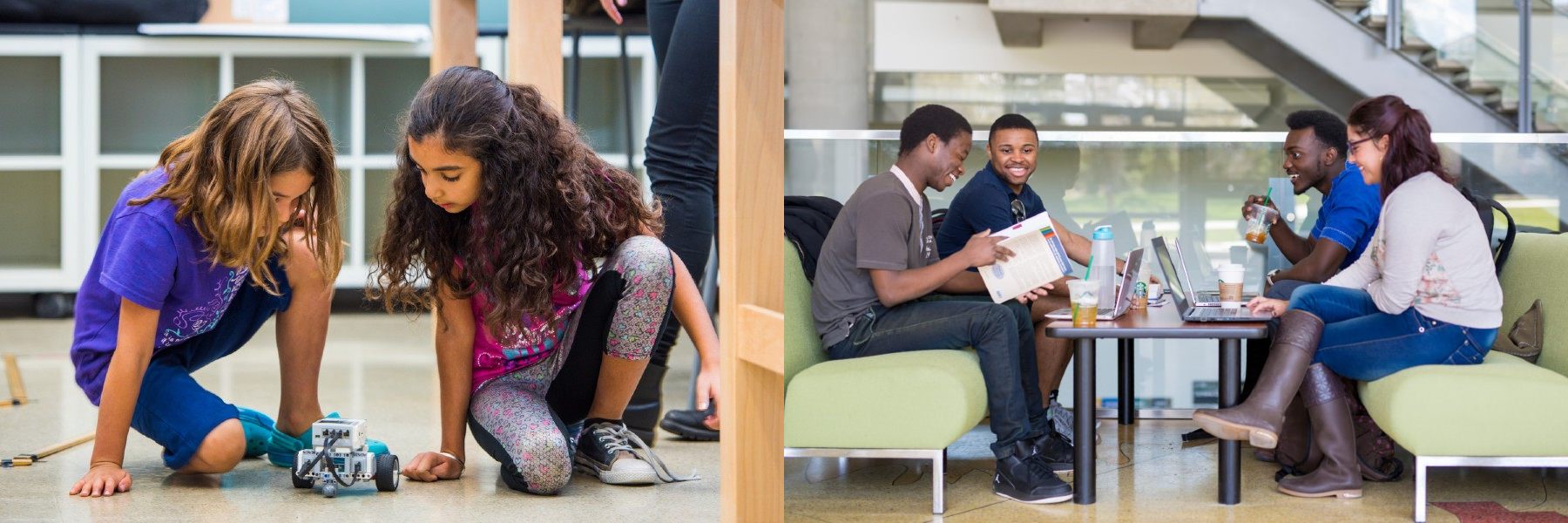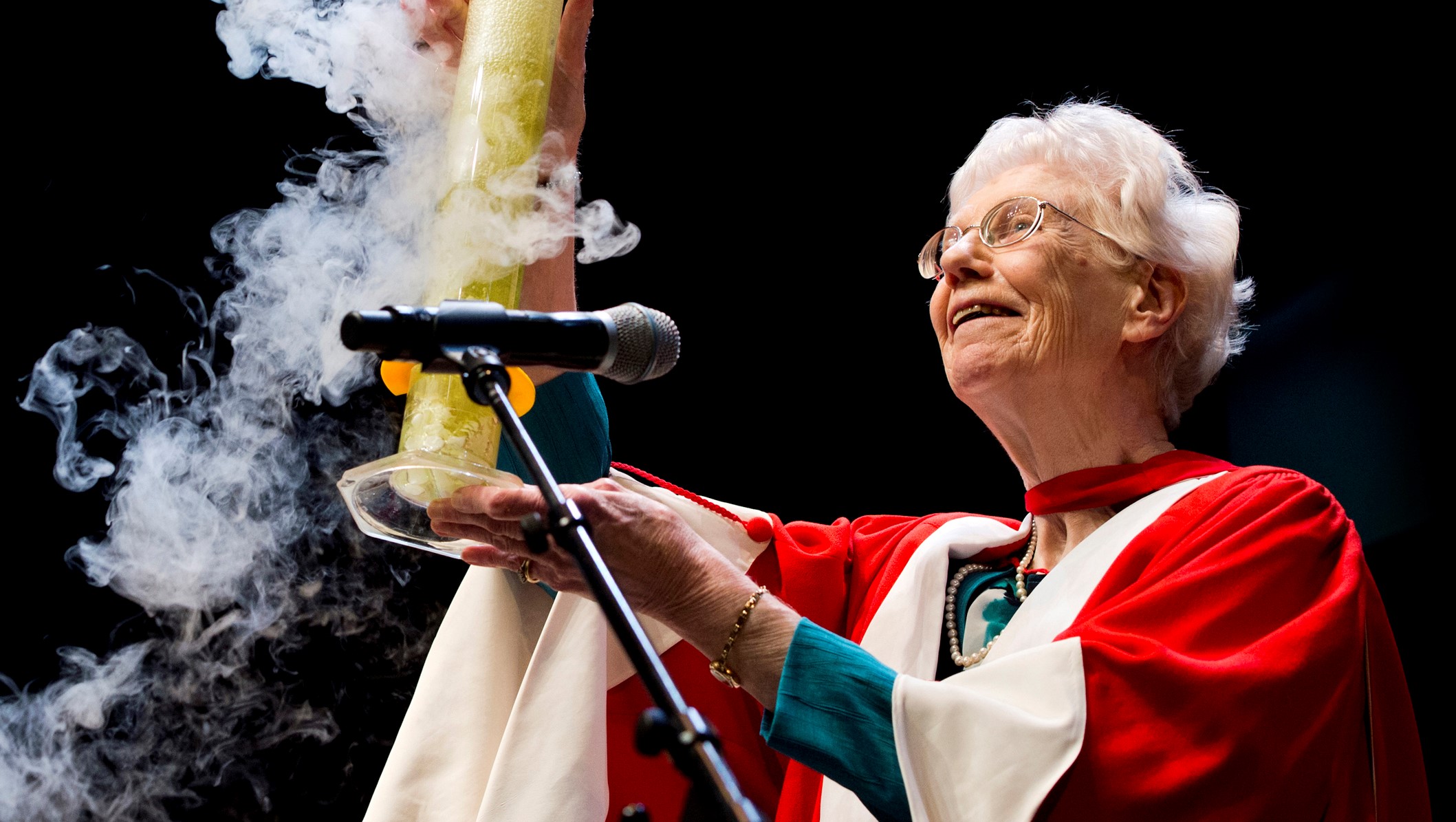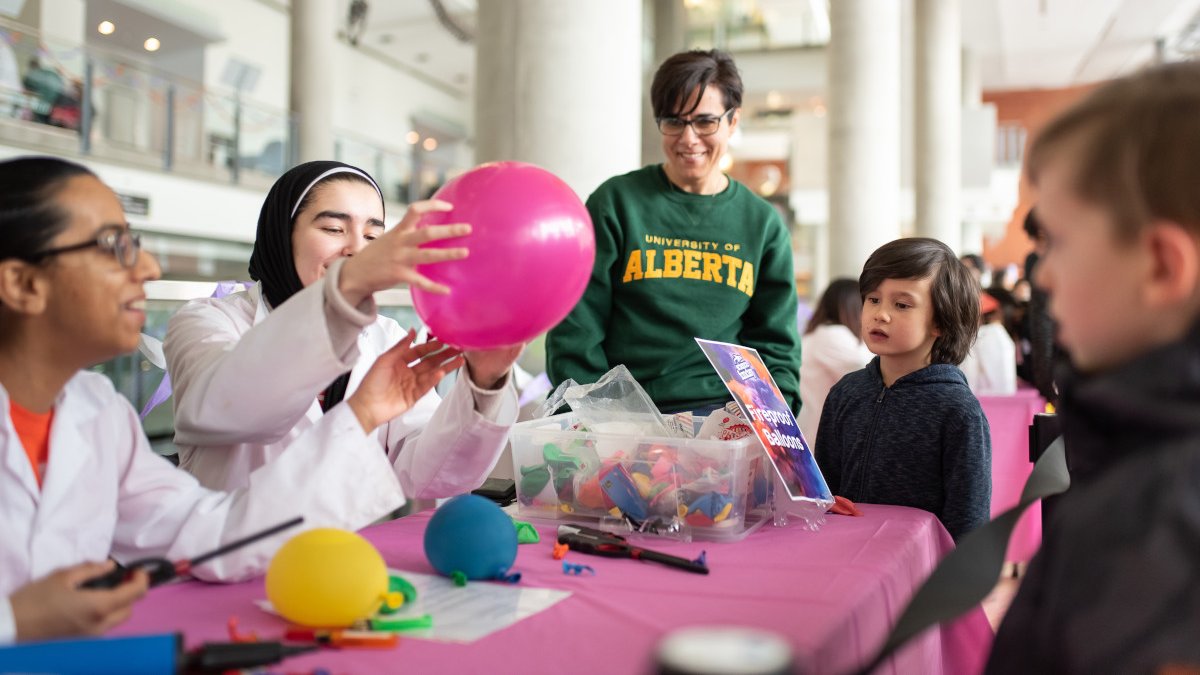The Faculty of Science welcomes diversity—from programs that engage K-12 learners in Science, undergraduate and graduate programs, hiring of staff, and leadership positions.
We know that diverse perspectives lead to creative and innovative problem-solving, new approaches and processes, and an increase in collective intelligence. These benefits are highly valued by the Faculty of Science. We recognize the importance of equity and inclusivity in employment in the Faculty of Science and for students enrolled in our programs. Support for diversity and the desire for inclusivity are central to our decision-making and activities.
Equity, Diversity, and Inclusivity (EDI) are central to the University of Alberta’s Strategic Plan For the Public Good (2016). Two years later, the University developed the four-year Strategic Plan for Equity, Diversity and Inclusivity, which aims to embed EDI into the culture of the University.
“The University of Alberta is committed to cultivating an institutional culture that values, supports, and promotes equity, human rights, respect, and accountability among faculty, staff, and students.”
The Faculty of Science is working to implement the University’s Strategic Plan for EDI. Under the leadership of Dean Matina Kalcounis-Rueppel, Engagement & EDI are key pillars in the Faculty of Science’s new Strategic Plan 2020-2025 UAlberta Science Ahead.
On this page: EDI Resources | EDI & Engagement Committee | Engagement & EDI groups and initiatives in Science | Latest news stories
EDI resources
- The Office of Safe Disclosure & Human Rights
- Discrimination and Harassment Complaint Procedure
- Office of the Student Ombuds
- Graduate Student Ombudsperson
- Discrimination, Harassment and Duty to Accommodate Policy
In addition to the resources above, Associate Dean Tara McGee, and Faculty of Science Engagement & EDI committee members Damian Collins, Lauren Guillette, and Christie McDermott are happy to be a first point of contact about EDI concerns for graduate students.
- Centre for Teaching and Learning Equity, Diversity, and Inclusivity website including information about Indigenization, Decolonization and Anti-Racism, and Inclusive Teaching and Learning.
- Considering equity, diversity and inclusion in your application.
- A presentation by Lisa Willis for the University of Windsor about Writing Effective EDI statements.
- What can you do to incorporate EDI into your research?
-
- Attend EDI presentations and other events in the Faculty of Science in the Faculty of Science, elsewhere on campus, and beyond.
- Complete free EDI training - from the Canadian Centre for Diversity and Inclusion and hollaback. The Government of Canada provides online unconscious bias training and a GBA+ course. There are also some excellent EDI podcasts available!
- Devote time in research group/lab meetings to conversations about EDI readings and events.
- Review EDI literature in research group/lab meetings. Lisa Willis has prepared a list of EDI resources. The Biology Graduate Students’ Association has also prepared a list of EDI resources, which is available here.
- Prepare a research group/lab manual or code of conduct which incorporates EDI principles. Here is an example from Chris Sturdy’s lab in the Psychology department.
- Researchers who support EDI can promote their support on their research group website.

EDI & Engagement Committee
The Faculty of Science’s Engagement and EDI efforts are currently being led by Associate Dean Engagement & EDI Tara McGee with a committee which includes people from across the Faculty of Science:
- Pramodh Senarath Yapa Arachchige, Science Graduate Student Association Council
- Shennella Blake, Recruitment and International Officer, Faculty of Science - Dean’s Office
- Nadine Buchanan, Student Life & SIP Advisor, Faculty of Science - Science Programs & Operations
- Keumhee Carriere Chough, Mathematics and Statistical Sciences
- Damian Collins, Earth and Atmospheric Sciences
- Lauren Guillette, Psychology
- Alona Fyshe, Computing Science
- Bhavana Kanagala, ISSS Undergraduate Student Association
- Christie McDermott, Chemistry
- Devang Mehta, Postdoctoral Fellow, Biological Sciences
- Marie-Cecile Piro, Physics
- Lisa Willis, Biological Sciences
The Faculty of Science has a long tradition of supporting equity and diversity. In 2005, Dr. Margaret-Ann Armour was appointed as the first Associate Dean of Diversity at the University and served in this position until her passing in 2019. In addition to her work in the Faculty of Science, Margaret-Ann Armour co-founded WISEST (Women in Scholarship, Engineering, Science and Technology), led a group that founded the Canadian Centre for Women in Science, Engineering, Trades and Technology (WinSETT Centre) and devoted her time to advancing EDI in STEM.
Engagement & EDI groups and initiatives in Science
The Faculty of Science and its seven departments engage children and youth K-12 through a range of activities. Click on the links below to find out more about these intiatives:
- Science summer camps
- Computing Science - CS High School Internship program
- Earth and Atmospheric Sciences - Collections & Museums
- Mathematical and Statistical Sciences - High School Mathematics Competition, Alberta Summer Mathematics Institute, CMS Regional Math Camps
- Physics - Department of Physics Astronomical Observatory, High School Physics Talks, High School Physics Experiments
- Science FUNday presented by Science FUNdamentals and the Faculty of Science
- Virtual Tours
Community Engagement Student Groups
There are many exciting EDI initiatives currently taking place in the Faculty of Science and in STEM more broadly. Learn more below.

Celebrating the legacy of Dr. Margaret-Ann Armour
The University of Alberta mourns Margaret-Ann Armour, Dean of Diversity, who spent most of her life championing women in STEM.
The student group, Working for Inclusivity in Chemistry (UAWIC), organizes an annual lecture series in honour of Margaret-Ann, which celebrates diversity in Chemistry by providing a platform for chemists who do outstanding work both in the lab and in promoting diversity and inclusivity within Chemistry.

First female Dean of Science
Matina Kalcounis-Rueppell, the first female Dean of Science, joined our faculty in July 2019.
"I would rather be in a place and time where we would not bat an eye at a woman being Dean of Science, but at the same time it is meaningful right now."

Connecting students with female scientists
The Department of Earth and Atmospherice Sciences invites two female scientists to visit the department each year and participate in several events as part of the Grace Anne Stewart Speaker Series.
The program is designed to expand the professional networks of faculty and students, foster discussion about gender equity, and provide students with more female role models and mentors.
Working for Inclusivity in Chemistry, created in 2017, is a student group in the Department of Chemistry dedicated to promoting diversity by fostering camaraderie, providing professional development opportunities, and increasing exposure to strong role models in Chemistry careers.
The UAlberta Working for Inclusivity in Chemistry group (formerly known as Women in Chemistry) is a student initiative that fosters relationships and mentorships between women in the Chemistry Department and women in other fields and industries with backgrounds in chemistry.
The goals of the Ualberta WIC group are to foster camaraderie among female members in the Chemistry Department, create opportunities for students to interact with female role models with events like the LOGIC Retreat, and organize career development workshops to help enhance the resumes of young scholars.
The Grace Anne Stewart Speaker Series was created by a group of graduate students and the Chair of the Department of Earth and Atmospheric Sciences in 2015. The speaker series was designed to bring female speakers to the department at a time when there were very few female professors in EAS.
Ada’s Team is a student group in the Department of Computing Science which promotes diversity in STEAM with an emphasis on technology. Ada’s Team is involved in a range of activities from outreach events to high school students, funding to enable students to attend conferences, and hosting technical workshops. Ada’s Team events are open to the public.
The Experiential Learning in Innovation, Technology, and Entrepreneurship (ELITE) Program for Black Youth provides youth with work-integrated training on real projects. Interns will take part in a full-time or part-time internship of 8 to 16 weeks.
Latest news
Read about the work being done in science from the perspective of people whose voices, historically, are not always heard.
Read diversity stories